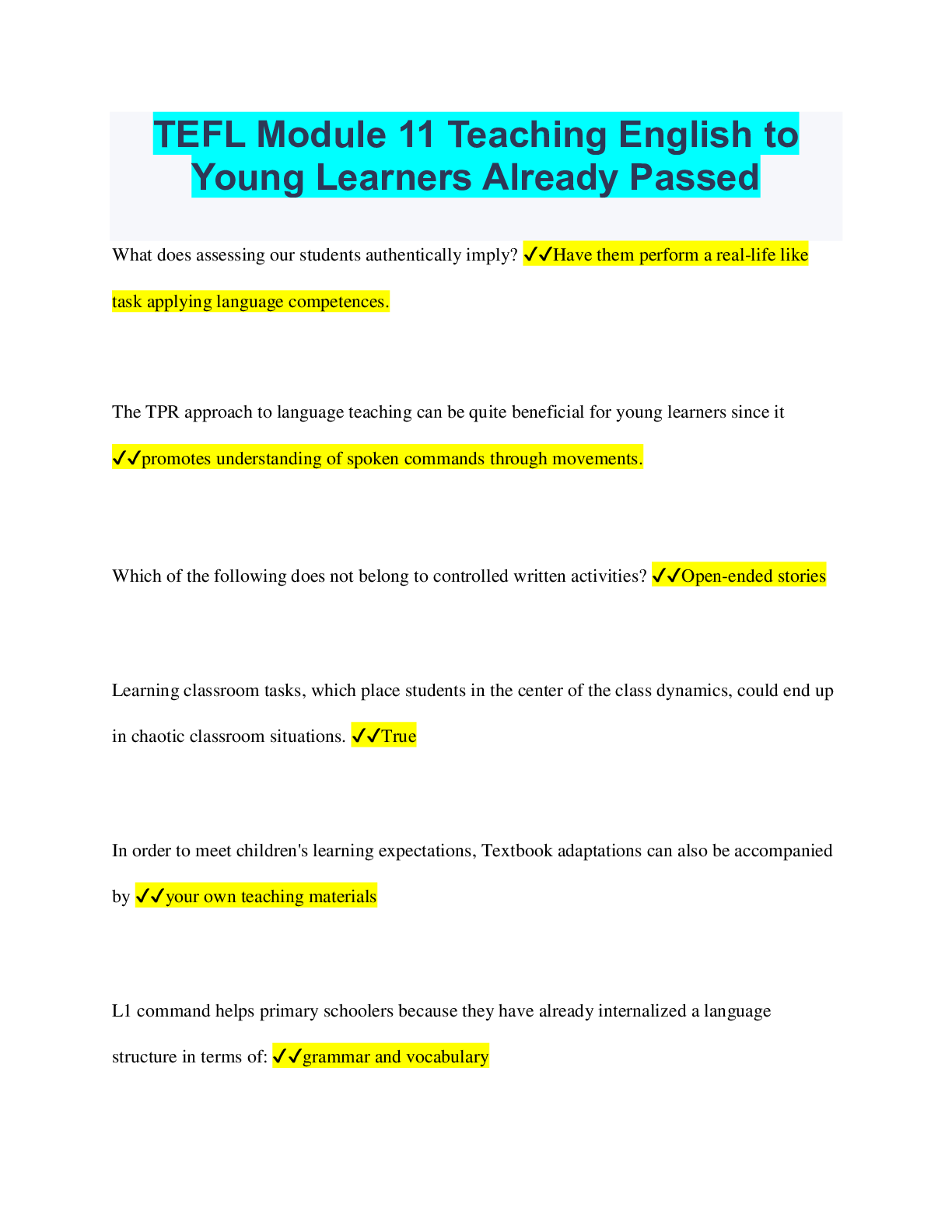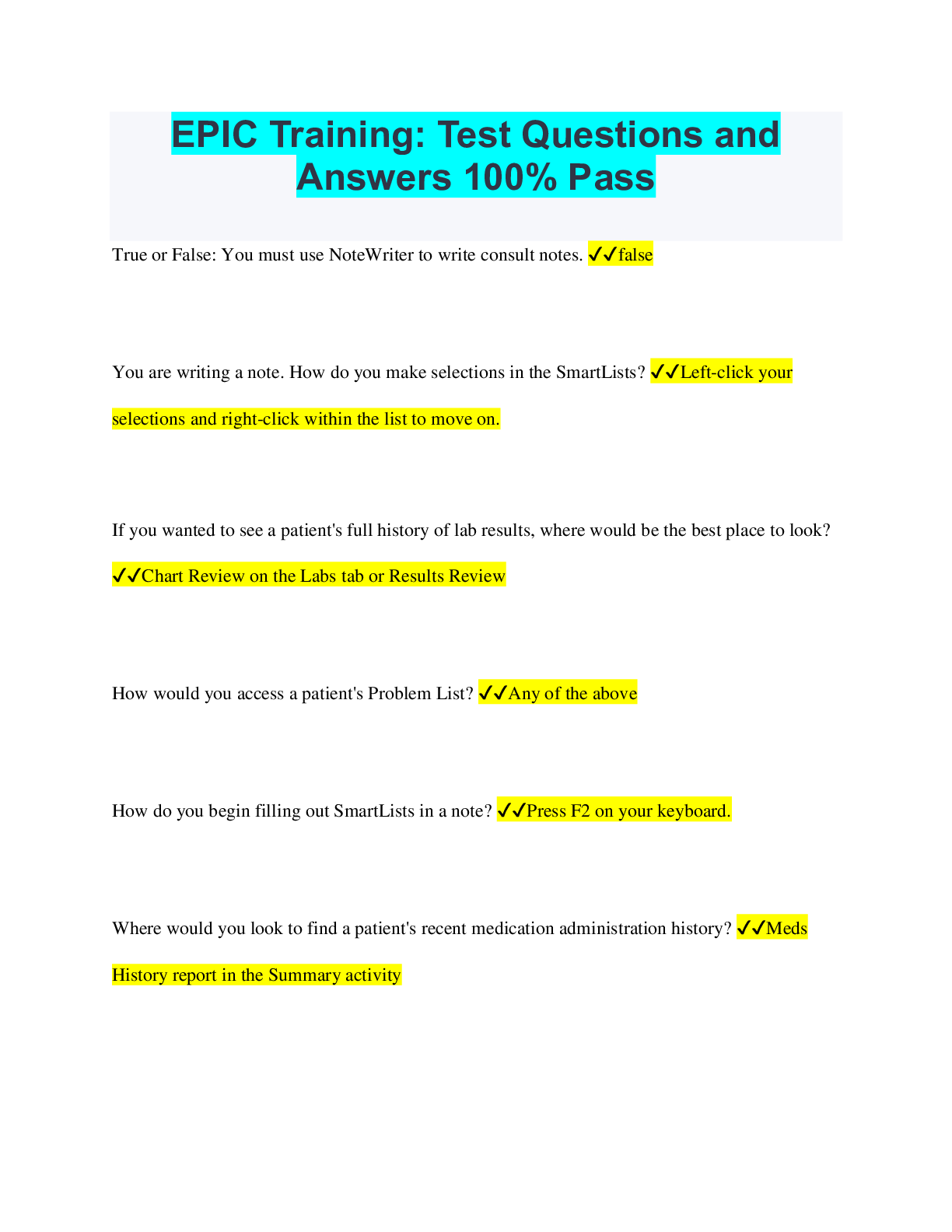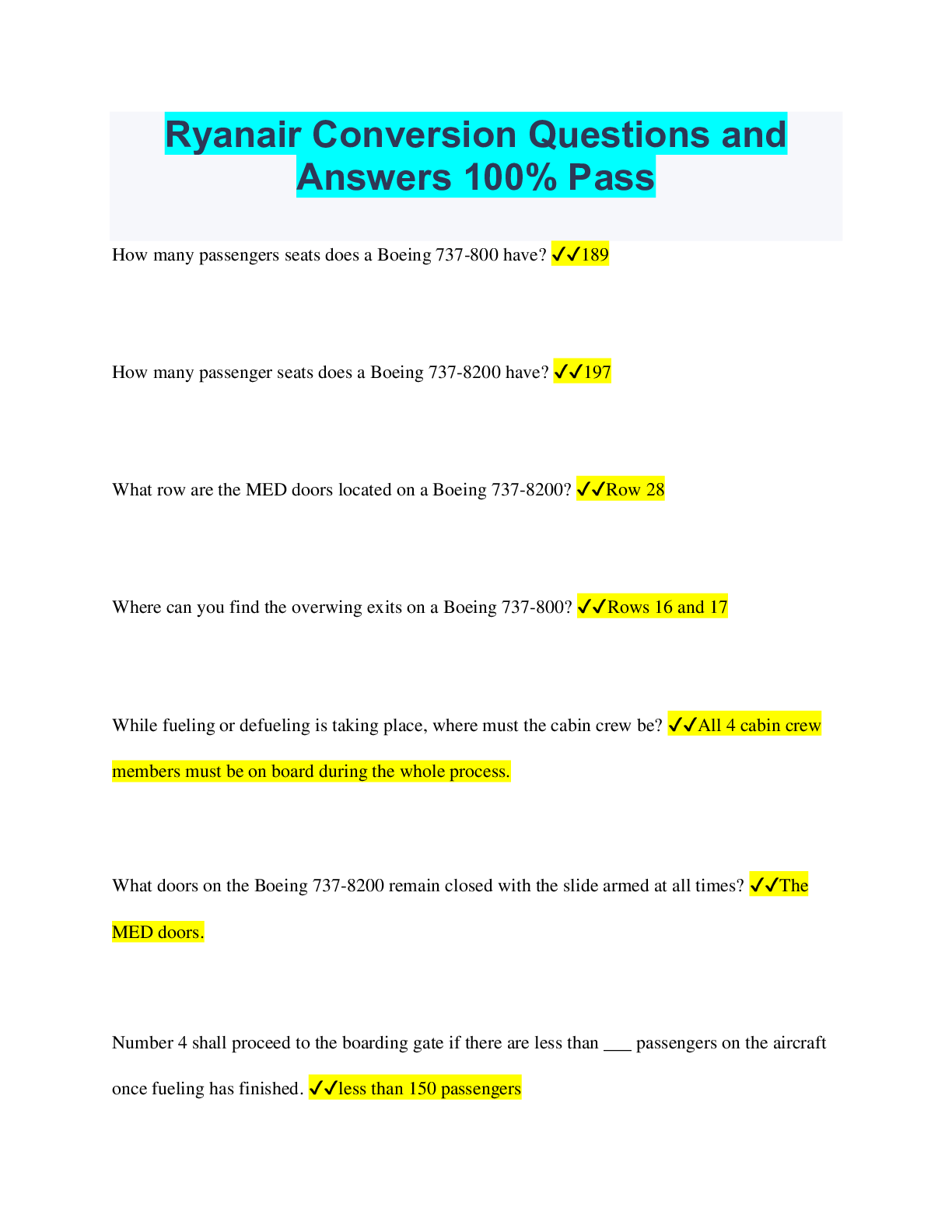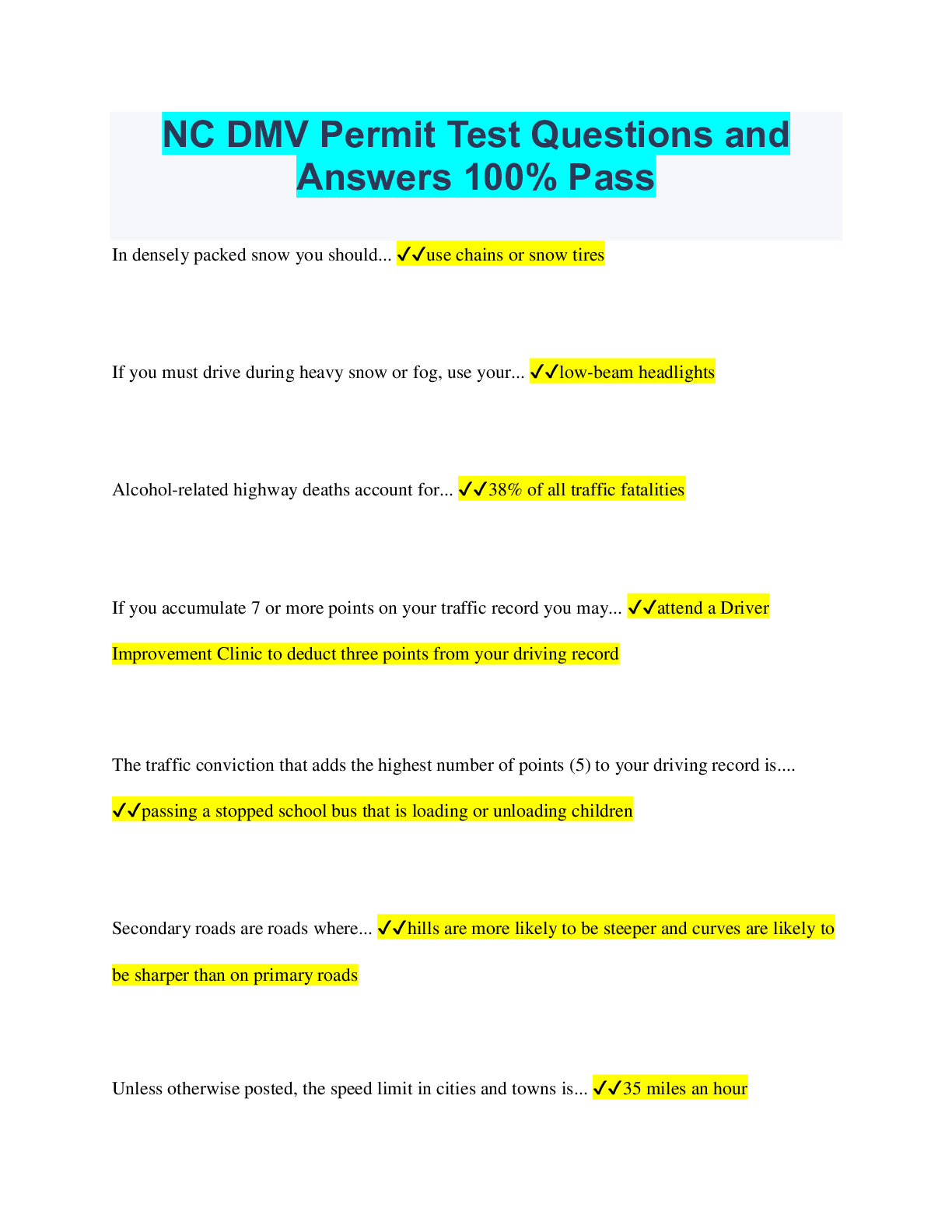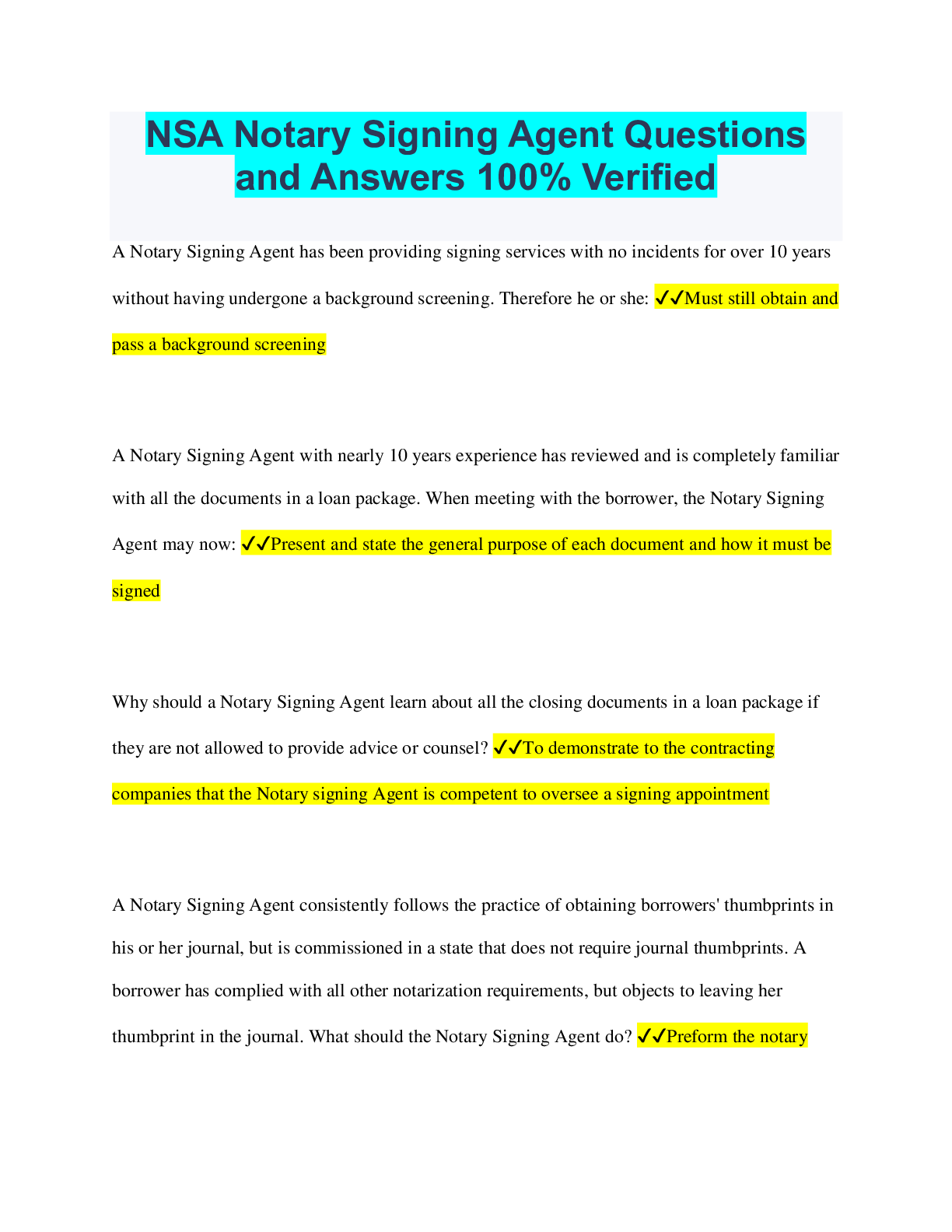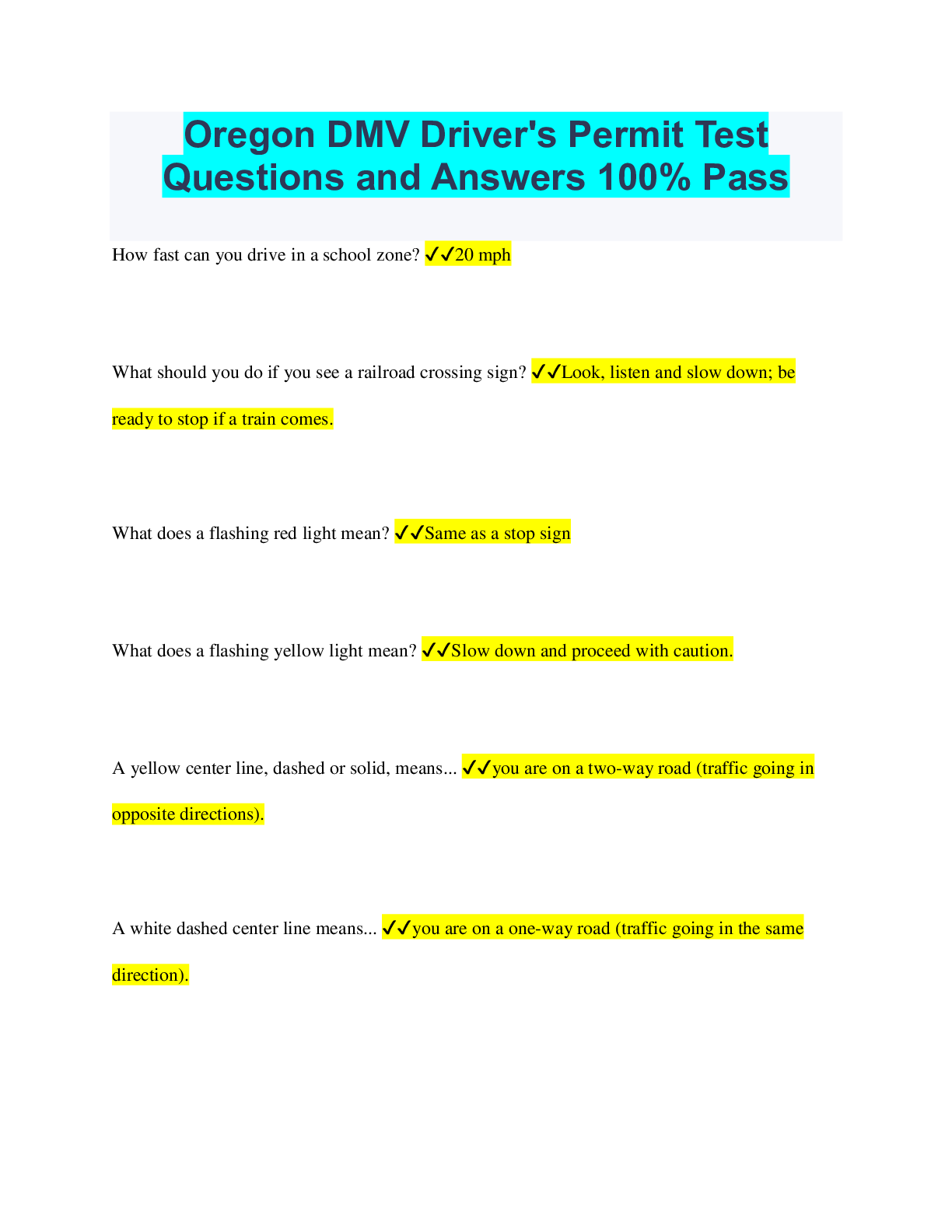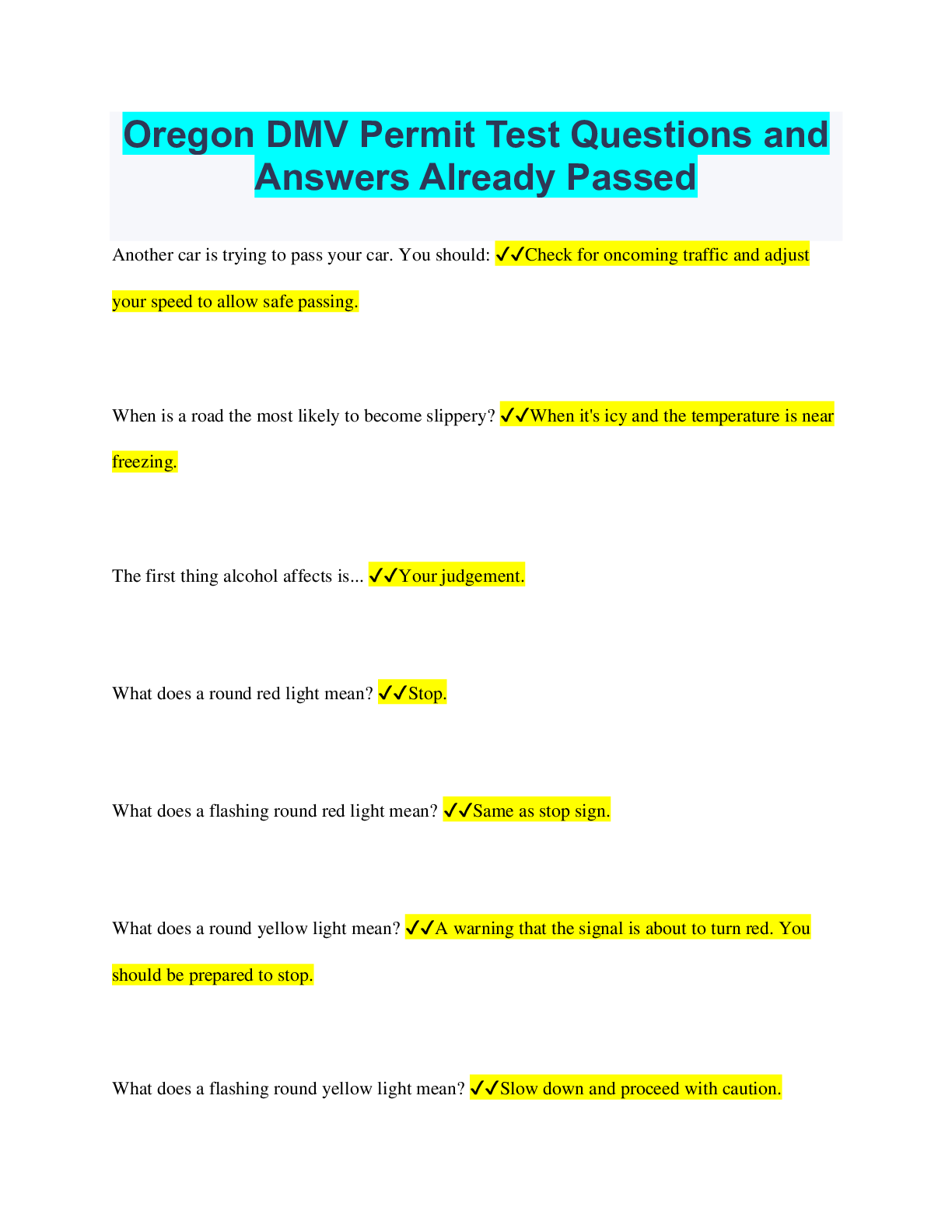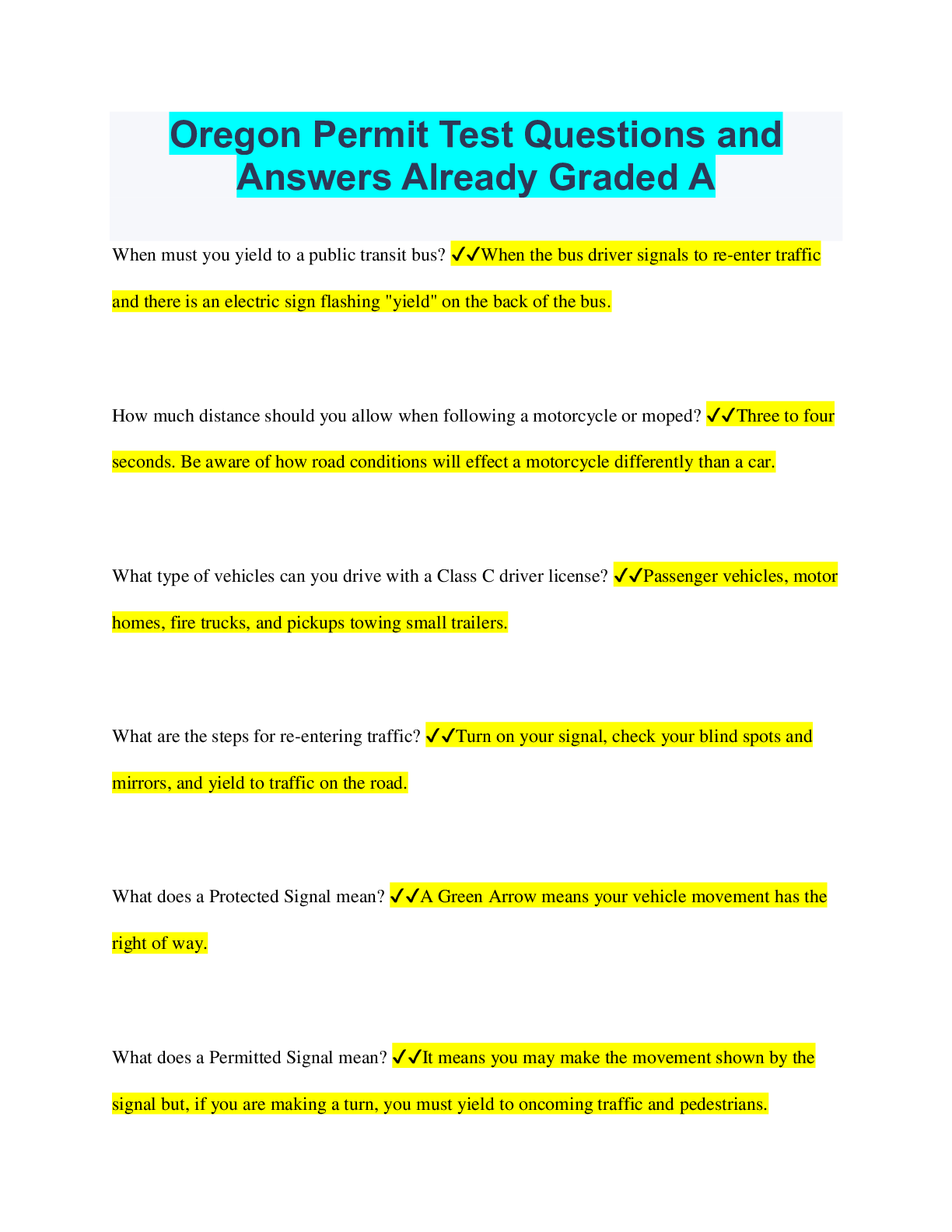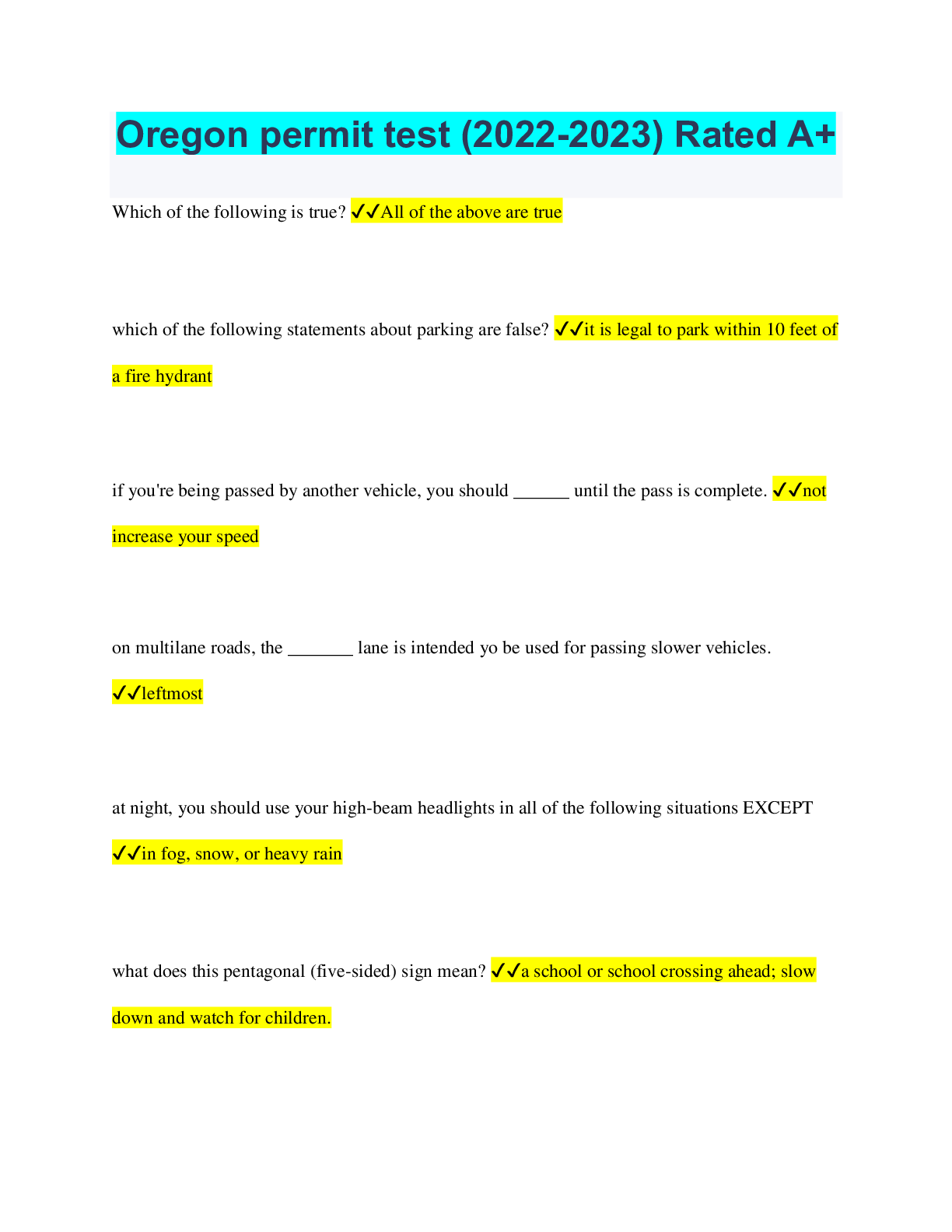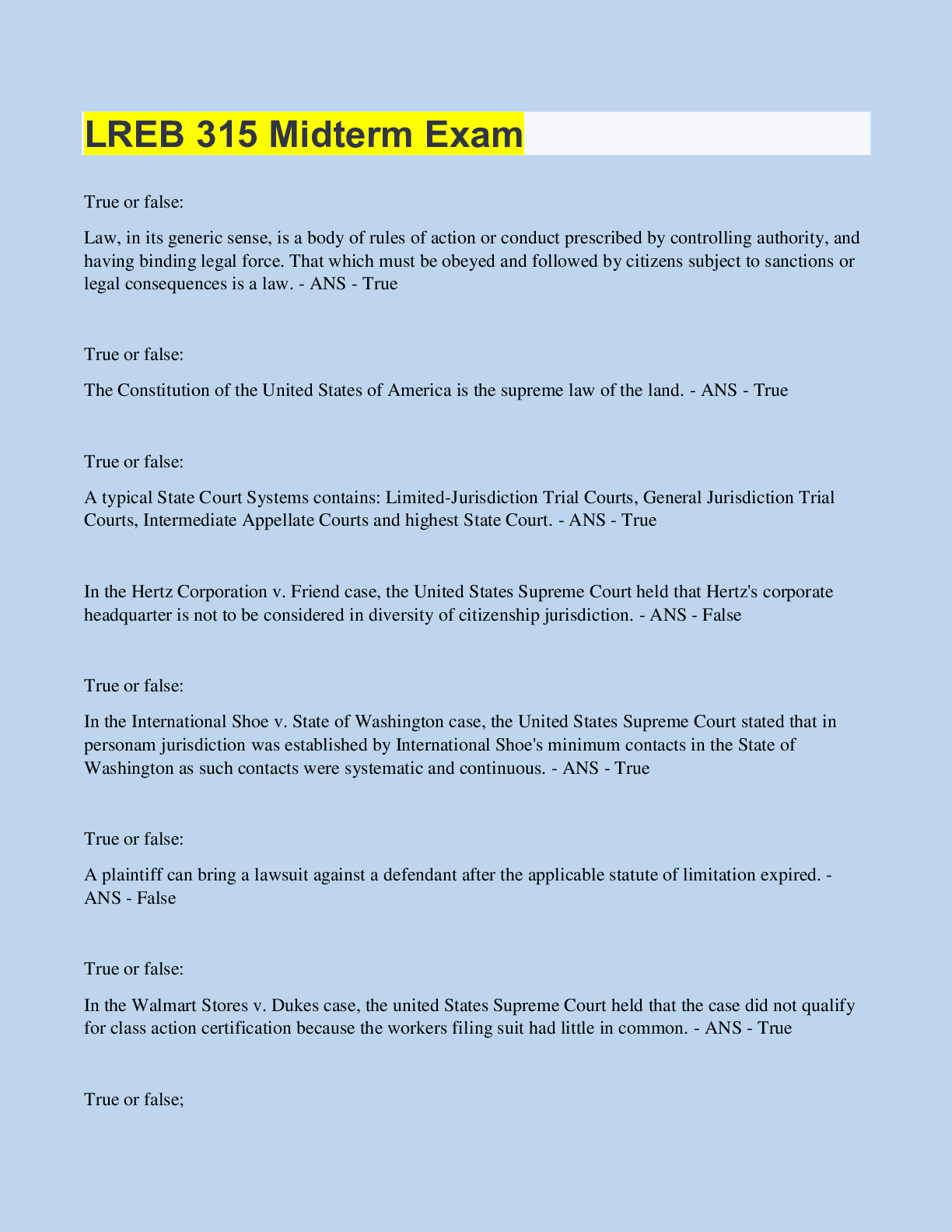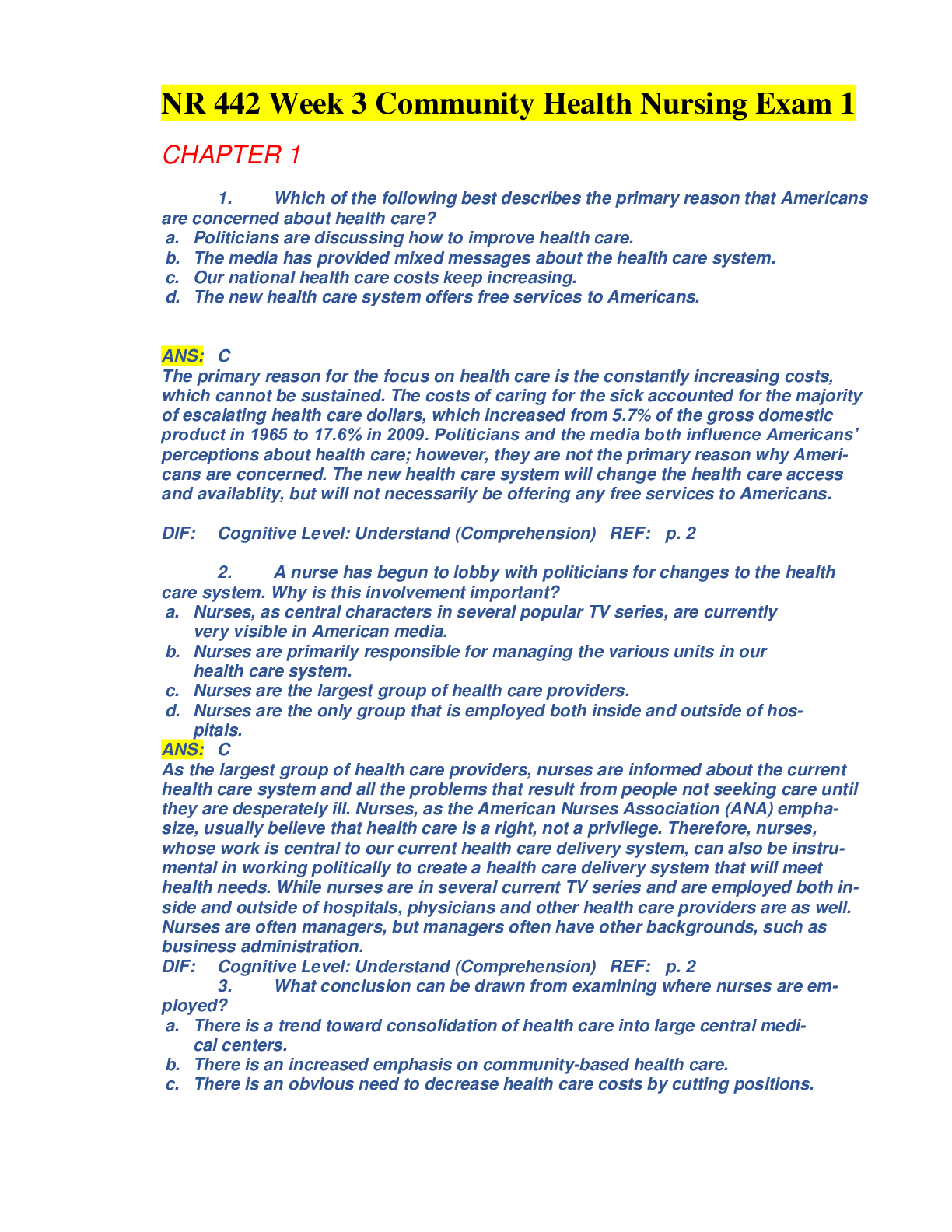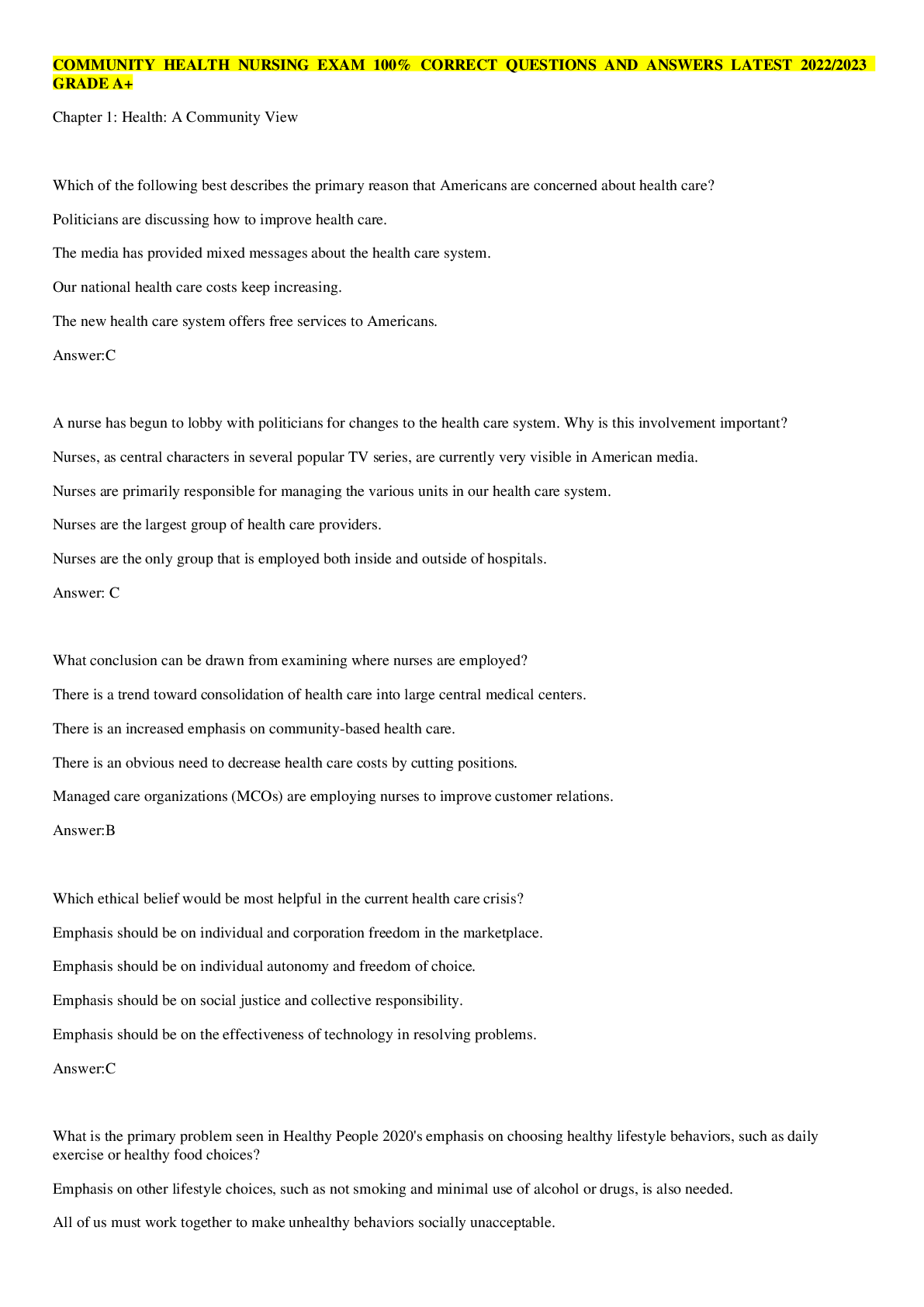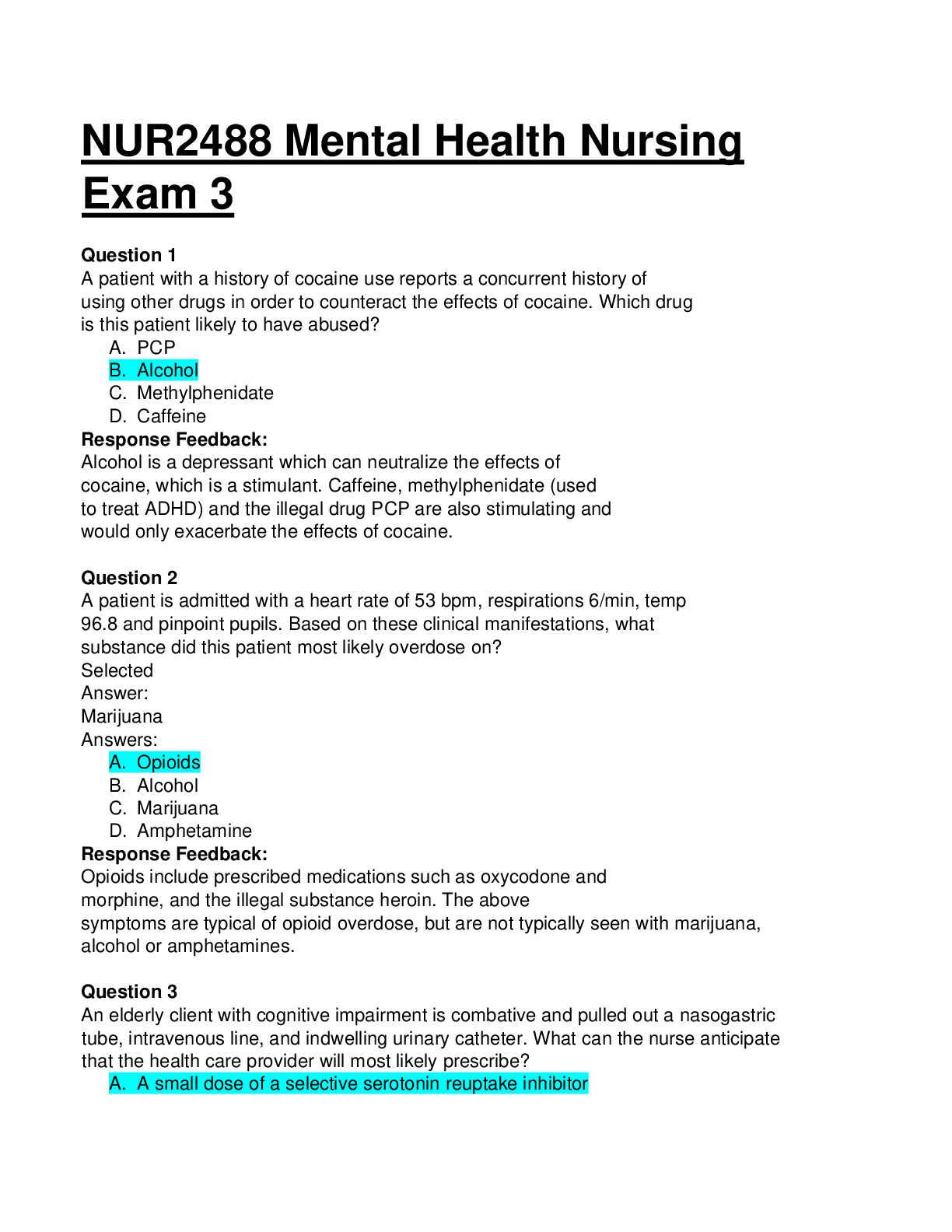*NURSING > QUESTIONS & ANSWERS > NUR2488 Mental Health Nursing Exam 1 Corrected (All)
NUR2488 Mental Health Nursing Exam 1 Corrected
Document Content and Description Below
User Lindsey Nelson Course NU249/NUR2488 Section 06 Mental Health Nursing - Online Plus - 2017 Winter Quarter Test NUR2488 Mental Health Nursing Exam 1 Corrected Started 1/23/17 4:03 PM Submitted... 1/23/17 4:03 PM Status Completed Attempt Score 32 out of 50 points Time Elapsed 33 minutes out of 1 hour Results Displayed All Answers, Submitted Answers, Feedback Question 1 0 out of 1 points A fully developed outcome for a client goal would include: (SATA) Selected Answers: Time sensitive Measurable terms Initial assessment Attainable for client Answers: Time sensitive Measurable terms Initial assessment Identifying data Attainable for client Response Feedback: No. Outcomes need to take into account the patient's culture, values, and ethical beliefs. Specifically, outcomes are stated in attainable and measurable terms and include a time estimate for attainment". Question 2 0 out of 1 points The nurse understands a client could be at risk for serotonin syndrome when taking which of the following medications in addition to over the counter medications or herbal supplements? Selected Answer: Haloperid ol Answers: Sertraline Haloperid ol Trazadon e Venlafaxi ne Response Feedback: No. Sertraline (Zoloft) is an SSRI, and when combined with over the counter medications or herbal supplements could increase the clients risk for developing serotonin syndrome. Question 3 0 out of 1 points A 4-year-old child grabs toys from siblings, saying, “I want that toy now!” The siblings cry and the child’s parent becomes upset with the behavior. Using Freudian theory, a nurse can interpret the child’s behavior as a product of impulses originating in the: Selected Answer: Ego Answers: Id Ego Superego Preconsci ous Response Feedback : No. The id operates on the pleasure principle, seeking immediate gratification of impulses. The ego acts as a mediator of behavior and would weigh the consequences of the action, perhaps determining that taking the toy is not worth the parent’s wrath. The superego would oppose the impulsive behavior as “not nice.” The preconscious is a level of awareness. Question 4 1 out of 1 points Which expected client outcome should a nurse identify as being correctly formulated? Selected Answer: Client will initiate interaction with one peer during free time within 2 days. Answers: Client will feel happier by discharge. Client will demonstrate two relaxation techniques. Client will verbalize triggers to anger by end of session. Client will initiate interaction with one peer during free time within 2 days. Response Feedback : Yes. The statement “Client will initiate interaction with one peer during free time within 2 days” is an example of a correctly formulated expected outcome. Outcomes should be measurable, realistic, client-focused goals that include a time frame. Appropriate nursing interventions are guided by client outcomes. Question 5 1 out of 1 points A voluntarily hospitalized patient tells the nurse, “Get me the forms for discharge against medical advice so I can leave now.” Which is the nurse’s best response? Selected Answer: “I will get them for you, but let’s talk about your decision to leave treatment.” Answers: “I can’t give you those forms without your health care provider’s knowledge.” “I’ll get the forms for you right now and bring them to your room.” “Since you signed your consent for treatment, you may leave if you desire.” “I will get them for you, but let’s talk about your decision to leave treatment.” Response Feedback : Yes. A patient who has been voluntarily admitted as a psychiatric inpatient has the right to demand and obtain release in most states. However, as a patient advocate, the nurse is responsible for weighing factors related to the patient’s wishes and best interests. By asking for information, the nurse may be able to help the patient reconsider the decision. The statement that discharge forms can’t be given without the health care provider’s knowledge is not true. Facilitating discharge without consent is not in the patient’s best interests before exploring the reason for the request. Question 6 0 out of 1 points The client is being admitted to the inpatient psychiatric unit. The nurse conducts a mental status examination. Which of the following items are included in this examination? (Select all that apply) Selected Answers: Appearance Mood and Affect Physical Exam Cognition Answers: Appearance Mood and Affect Thought Physical Exam Cognition Response Feedback: Personal information, appearance, behavior, speech, mood and affect, thought, perceptual disturbances and cognition are all parts of a mental status exam. Physical assessment would not be included with the MSE. (Chapter 7, p 103-104) Question 7 1 out of 1 points A client with schizophrenia has recently begun a new medication, clozapine (Clozaril). Which signs and symptoms of a potentially fatal side effect will the nurse teach the client about? Selected Answer: Blurring vision and muscular weakness Answers: Blurring vision and muscular weakness Sore throat, fever, and malaise Tremor, shuffling gait, and neck stiffness Fine tremor, tinnitus, and nausea Response Feedback: Yes. These are symptoms of agranulocytosis, which is a potentially fatal disorder in which the client's white blood cell count drops to extremely low levels. This places the client at great risk for infections. Question 8 0 out of 1 points Which information suggests that caution is necessary in prescribing a benzodiazepine to an anxious client? Selected Answer: The client has a history of diabetes mellitus. Answers: The client has a history of alcohol dependence. The client has a history of diabetes mellitus. The client has a history of schizophrenia. The client has a history of hypertension. Response Feedback: No. Tolerance and psychological dependence are common problems with the long-term use of benzodiazepines. They should be used cautiously with clients who have a history of substance abuse. Question 9 1 out of 1 points A brother calls to speak to his sister who has been admitted to the psychiatric unit. The nurse connects him to the community phone and the sister is summoned. Later the nurse realizes that the brother was not on the client’s approved call list. What law has the nurse broken? Selected Answer: The Health Insurance Portability and Accountability Act Answers: The National Alliance for the Mentally Ill Act The Tarasoff Ruling The Health Insurance Portability and Accountability Act The Good Samaritan Law Response Feedback: The nurse has violated the Health Insurance Portability and Accountability Act (HIPAA) by revealing that the client had been admitted to the psychiatric unit. The nurse should not have provided any information without proper consent from the client. Question 10 1 out of 1 points The client attempted suicide by overdosing on pain medication. Once the client ingested the medication, she decided that she did not want to die and she sought immediate treatment. Once the client recovered from the physical effects of overdose, the client voluntarily sought inpatient mental health treatment. Which of the following statements is true of voluntary admission? Selected Answer: The client retains the right to request release Answers: The client is required to stay a minimum of 72 hours The client must have certification by two or more physicians Only a judge can determine if the client is able to be discharged The client retains the right to request release Response Feedback : Yes. Release from the hospital depends on the patient’s admission status. All clients have the right to request release; thereby negating a 72 hour length of stay. It may not be granted if there is a civil commitment process. Certification is required by physicians or judges in a commitment process. (Chapter 6 pp 82-83) Question 11 1 out of 1 points A nurse says to a client, “Things will look better tomorrow after a good night’s sleep.” This is an example of which communication technique? Selected Answer: The nontherapeutic technique of giving reassurance Answers: The therapeutic technique of giving advice The therapeutic technique of defending The nontherapeutic technique of presenting reality The nontherapeutic technique of giving reassurance Response Feedback : Yes. The nurse’s statement, “Things will look better tomorrow after a good night’s sleep,” is an example of the nontherapeutic communication technique of giving reassurance. Giving reassurance indicates to the client that there is no cause for anxiety, thereby devaluing the client’s feelings. Question 12 1 out of 1 points A patient is involuntarily admitted to a psychiatric unit after calling a friend and saying, “I’ve got a gun and I’m going to shoot myself.” Which of the following rights has the patient lost temporarily? Selected Answer: The right to leave the hospital without medical approval Answers: The right to communicate with family members Freedom of speech The right to refuse medications The right to leave the hospital without medical approval Response Feedback: Yes. If a patient is admitted involuntary, she cannot leave without medical or court approval. The patient still retains the rights to communicate with family, refuse medication and speak her mind. Question 13 1 out of 1 points A depressed client states, “I have a chemical imbalance in my brain. I have no control over my behavior. Medications are my only hope to feel normal again.” Which nursing response is appropriate? Selected Answer: “Medications are one way to address chemical imbalances. Environmental and interpersonal factors can also have an impact on biological factors.” Answers: “Medications are one way to address chemical imbalances. Environmental and interpersonal factors can also have an impact on biological factors.” “Because biological factors are the sole cause of depression, medications will improve your mood.” “Environmental factors have been shown to exert the most influence in the development of depression.” “Researchers have been unable to demonstrate a link between nature (biology and genetics) and nurture (environment).” Response Feedback : Yes. The nurse should advise the client that medications are one treatment approach to address biological factors, but there are other factors that affect mood. The nurse should educate the client on environmental and interpersonal factors that can lead to depression and the potential for psychological treatments to have a positive impact on biological factors Question 14 1 out of 1 points During an intake interview, which question would assist the nurse in gathering data about the client’s judgment? Selected Answer: “If you found a stamped, addressed envelope in the street, what would you do?” Answers: “Do you know what day and season it is now?” “On a scale of 1 to 10, how would you rate your stress level?” “What does the phrase ‘a rolling stone gathers no moss’ mean to you?” “If you found a stamped, addressed envelope in the street, what would you do?” Response Feedback : Yes. In the assessment phase of the nursing process, the nurse collects comprehensive health data that are pertinent to the client’s health or situation. The nurse presents a situation that requires the client to make a judgment call and can assess appropriate judgment on the basis of the client’s action choice. Question 15 1 out of 1 points A nursing instructor asks a student to describe the nursing process when initiating care of a client. The student nurse understands the nursing process order to be correctly identified as: Selected Answer: Assessment, Nursing Diagnosis, Outcomes, Planning, Implementation, Evaluation Answers: Assessment, Nursing Diagnosis, Outcomes, Planning, Implementation, Evaluation Assessment, Medical Diagnosis, Implementation, Planning, Outcomes and Evaluation Assessment, Nursing Diagnosis, Implementation, Planning, Outcomes, and Evaluation Assessment, Medical Diagnosis, Planning, Outcomes, Implementation and Evaluation Response Feedback : Yes. The nursing process as is follows: assessment, nursing diagnosis, outcomes, planning, implementation, and evaluation. It should not include medical diagnoses. Identifying the outcomes allows for planning followed by implementation. Evaluations needs to occur after nursing interventions have been implemented. Question 16 0 out of 1 points During an intake assessment, a nurse asks both physiological and psychosocial questions. The client angrily responds, “I’m here for my heart, not my head problems.” Which is the nurse’s best response? Selected Answer: “Why are you concerned about these types of questions?” Answers: “It’s just a routine part of our assessment. All clients are asked these questions, you need to answer them.” “Why are you concerned about these types of questions?” “Psychological factors, like excessive stress, have been found to affect medical conditions.” “We can skip these questions, if you like. It isn’t imperative that we complete this section.” Response Feedback: No. The nurse should attempt to educate the client on the negative effects of excessive stress on medical conditions. It is not appropriate to skip either physiological or psychosocial questions, as this would lead to an inaccurate assessment. Question 17 0 out of 1 points A mother rescues two of her fou [Show More]
Last updated: 2 years ago
Preview 1 out of 27 pages

Buy this document to get the full access instantly
Instant Download Access after purchase
Buy NowInstant download
We Accept:

Reviews( 0 )
$13.00
Can't find what you want? Try our AI powered Search
Document information
Connected school, study & course
About the document
Uploaded On
May 02, 2022
Number of pages
27
Written in
Additional information
This document has been written for:
Uploaded
May 02, 2022
Downloads
0
Views
115

.png)

